Being charged with a crime in North Dakota can be one of the most serious and stressful circumstances one faces during their life. It is important that you hire an experienced, well-respected North Dakota criminal defense attorney that will fight for your rights.
The attorneys at Sand Law, PLLC have handled countless criminal cases at all stages of litigation. From administrative hearings to jury trials, our lawyers provide tough, intelligent, and compassionate representation.
Whether you have been charged with a low-level misdemeanor or a serious felony, you need a North Dakota criminal defense lawyer. Contact our office by calling (701) 380-8390 or submitting a contact form for a free initial consultation.
Click here to review our exceptional case results: View Our Recent Case Results

Criminal law is a system of rules that defines what is considered a crime and how the government might prosecute an individual that commits a crime. Federal, state, and local governments all have different laws pertaining to different crimes.
Something that is illegal on the federal level may be legal on the state level. For example, in many states marijuana possession is legal, however it is illegal at the federal level; that is, the United States considers it a crime.
Each of the levels of government prohibit certain actions and have a defined punishment for that criminal offense. For example, if a person in North Dakota physically assaults another person, they may be charged with the state offense of assault.
Individuals who violate a law can face many different punishments, including community services, restitution, monetary fines, probation, or incarceration in a county jail or state prison.
Similarly to a personal injury lawsuit in which a person files a lawsuit against another person, in a criminal offense, the lawsuit is filed by the government against the alleged criminal.
These proceedings are handled by someone known as a prosecuting attorney who acts on behalf of the government to enforce and prosecute the law.
A crime is “any act or omission of an act in violation of a law forbidding or commanding it”. What constitutes a crime is defined by statute (or a specific law); statutes vary from state to state and government to government.
[For a list of federal crimes, click here.]
[For a list of North Dakota criminal laws click here.]
Criminal laws in North Dakota can usually be characterized into two classes:
Felonies include serious crimes, such as murder, and are usually punishable by incarceration for a year or more. Misdemeanors are less serious criminal offenses. Consequently, they are punishable by probation, less than a year in jail, or fines. For information on misdemeanors, research North Dakota Misdemeanor Crimes by Class and Sentences.
North Dakota criminal laws typically break crimes down into:
In order to be convicted of a crime in North Dakota, a state prosecutor must prove that the defendant meets both of these elements. This means that a person must commit the unlawful act (actus reus) and must have done it intentionally or known it was wrong while doing it (mens rea).
A prosecutor cannot simply say that a defendant committed a crime. Instead, a prosecutor must investigate and prove each and every element of a crime beyond a reasonable doubt in order for a defendant to be convicted.
At Sand Law PLLC, our team has a proven process for managing North Dakota criminal defense cases. More specifically, it consists of three main stages:
1. Case Review
2. Negotiating the Case
3. Trial
Firstly, it is important to conduct an in-depth case evaluation. That means that the very first thing our attorneys do is compile all of the discovery in your case. Discovery generally includes all police reports, witness statements, audio/video evidence, reports, and crime lab evidence.
Our North Dakota criminal defense attorneys then go through the evidence with a fine-tooth comb. We will search for any legal, factual, statutory, or constitutional issues with your case.
Depending on the facts of your case, it may be necessary to submit a motion to suppress evidence or to dismiss the case. That is why an in-depth review is vital to any case evaluation.
Next, we discuss your case with the prosecution and relay any potential plea agreement negotiations with you. Then, we’ll discuss with you the best strategy moving forward. This may entail accepting a plea deal in order to avoid jail time or to keep a crime off of your record.
Finally, if after we discuss plea agreement options and decide it is in your best interest to forgo that process – we take your case to trial. Our attorneys have an abnormally high success rate at trial, having secured multiple victories for both felony and misdemeanor cases.
[Click here for What You Need to Know when Arrested in North Dakota.]
Our team of seasoned representatives has experience defending clients charged with a wide range of criminal offenses committed in North Dakota. We take on many types of felony and misdemeanor criminal cases, such as:
We handle cases throughout the entire State of North Dakota, from Williston to Fargo criminal defense.. Sand Law PLLC has offices in:
We are strategically located to serve you legal needs. Not only do we serve the exact areas where we have offices, but we also serve all of the areas around each office and across North Dakota.
When you are facing criminal charges, you need a defense attorney who can reliably appear in court on your behalf. You can count on Sand Law PLLC to advocate for you, regardless of which North Dakota court you case is being heard in. We defend clients in:
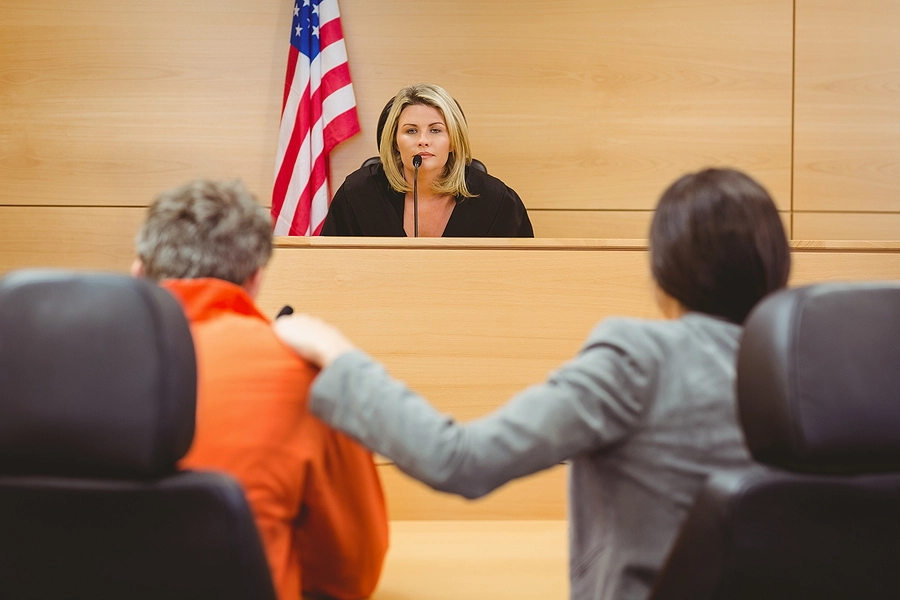
The following are the major types of criminal defense cases that our team handles for our clients:
If you were arrested for driving under the influence (DUI) or for driving while intoxicated or impaired, for example driving while under the influence of alcohol or drugs in North Dakota, then you need to get the help of a DUI attorney.
A DUI or DWI charge could result in serious penalties and will definitely negatively affect your life. It may be expensive, it could cost you your job, you may have limited transportation options, and you could face other criminal penalties.
A North Dakota DUI/DWI defense attorney from Sand Law PLLC may be able to have your DUI or DWI charge reduced.
If you have been accused of willfully causing bodily harm to another person, you may be charged with assault in the state of North Dakota. You may be charged with simple assault or assault depending on the amount of injury you allegedly caused the victim.
Assault can run the gambit on its level severity, including Aggravated Assault, Reckless Endangerment, Felony, and Misdemeanor. Assault can be classified as a Class B Felony, Class C Felony, Class A Misdemeanor, Class B Misdemeanor.
Possession of controlled substances can vary greatly in North Dakota drug crimes, and therefore so can the penalties for possession. North Dakota classifies many drugs as controlled substances, like marijuana, cocaine, heroin, and methamphetamine.
Illegally making, possessing, or selling drugs can be classified as misdemeanors or felonies and can cause serious disruption in one’s life. North Dakota classifies drugs into something called schedules.
They range from Schedule I, which are considered the most dangerous drugs, to Schedule V, which are considered the least dangerous. Your North Dakota criminal defense attorney can employ common defenses against drug charges to help your case.
Sex crimes are defined by violence during a sexual act, lack of consent, or engaging in a sexual act with an individual who is legally incapable of consent. North Dakota sex crimes can have serious consequences.
They may require incarceration and registration as a sex offender. Consequently, this can seriously impact a person’s job, housing, and social opportunities.
North Dakota categorizes felony crimes into four categories: Class AA, Class A, Class B, and Class C. Class AA felonies are the most serious in North Dakota, while Class C offenses are the least serious.
Felonies in North Dakota have a maximum possible penalty, therefore there is a limit on the amount of punishment imposed. This depends on the class level:
Class AA: Up to life imprisonment without parole
A: Up to 20 years imprisonment and up to $10,000 in fines
B: Up to 10 years’ imprisonment and up to $10,000 in fines
C: Up to five years’ imprisonment and up to $5,000 in fines
Theft crimes involve the taking of the property of another with the intent to deprive them of it permanently. Theft is often categorized into two different categories: larceny and theft crime.
Larceny is defined as: the unauthorized taking of another person’s property with the intent to permanently deprive them of the use of the property. So, the basic distinction between robbery and larceny is that robbery involves the use of force, whereas larceny doesn’t.
Not only do we represent clients charged with minor criminal offenses, but we also have the resources and skills to handle cases involving major felonies.
North Dakota’s state prosecuting attorneys must file criminal charges against the accused within a certain period of time. This limited time period is known as the criminal statute of limitations.
These time limitations vary depending on the type of crime committed. The time period usually begins on the day the crime was committed, but this can vary depending on the circumstances.
This is to prevent someone from leaving the state in order to wait for the clock to run out, or some other similar circumstances. In those cases, the time limit would not begin until the person is living back in North Dakota and their location is known.
North Dakota’s Statute of Limitations helps to:
In North Dakota, there is no statute of limitations for murder. For child victims under the age of 15, the statute of limitations does not begin until they reach the age of 15. All misdemeanors in the state of North Dakota have a two-year statute of limitations.
More information about North Dakota Statute of Limitations can be found under Chapter 29-04 in the ND Century Code.
To summarize the time limits that the state has to bring charges:
The statute of limitations for felonies vary based on the crime. The statute of limitations in North Dakota for felony charges is three years.
For murder in North Dakota, there is no statute of limitations. For sexual abuse of a child, the statute of limitations is 21 years.
The North Dakota Statute of Limitations for misdemeanors is two (2) years.
If a minor victim was under the age of 15 at the time of the crime, the statute of limitations doesn’t begin until they reach the age of 15. This adds years to the statutes for crimes against children.
A criminal conviction can have life-long, life-altering consequences for you and your family. With so much at stake, you can’t afford to hire anything less than the best when it comes to a criminal defense attorney.
Clients across the state have trusted the North Dakota criminal defense lawyers of Sand Law for years to protect their rights, defend their case, and fight for a fair outcome. We are ready to do the same for you. You can rely on us to provide a compelling defense with comprehensive support.
Speak to our North Dakota criminal defense lawyers handling felonies, misdemeanors, DUI, and drug charges today. We have offices in Minot, Watford City, Williston, & Bismarck.
If you or a loved one has been charged with a criminal offense in the state of North Dakota, contact the aggressive and experienced defense attorneys at Sand Law PLLC.
We have the resources, experience, and zeal to defend our clients in the best way possible in order to dismiss or lessen your charge. Call (701) 609-1510 or email us for a criminal case consultation.
In North Dakota, you can represent yourself in a criminal defense case, a process known as “pro se” representation. However, it’s generally not recommended due to the complexities of criminal law and the potential consequences of a conviction, such as jail time and fines.
Sand Law ND criminal defense lawyers have the experience to navigate legal procedures, challenge evidence, and negotiate plea deals. If you cannot afford a lawyer, you may qualify for a court-appointed defense attorney.
It’s advisable to seek legal representation to ensure your rights are protected and to improve your chances of a favorable outcome.
Bail and bond both serve to ensure a defendant’s appearance in court, but they differ in terms of payment and responsibility. Bail is the cash amount set by the court that a defendant must pay to be released from custody before trial. If the defendant appears in court as required, the bail is refunded.
A bond, on the other hand, involves a third party, typically a bail bondsman, who posts bail on the defendant’s behalf for a fee, usually a percentage of the bail amount. The bondsman assumes responsibility for ensuring the defendant’s court appearances.
If you’re arrested in North Dakota, you have several key rights. Firstly, you have the right to remain silent to avoid self-incrimination, as anything you say can be used against you in court.
You also have the right to an attorney; if you cannot afford one, a court-appointed lawyer will be provided. You must also be informed of the charges against you and have the right to a fair and speedy trial under the ND rules of criminal procedure.
Additionally, you have the right to reasonable bail, unless charged with a serious offense. These rights are designed to protect you throughout the legal process.
In North Dakota, common defenses to criminal charges include:
Alibi: This entails demonstrating that the defendant was elsewhere when the crime occurred.
Self-Defense: Your criminal defense attorney will argue that actions were necessary to protect yourself or others from harm.
Insanity: This defense involves claiming the defendant was unable to understand the nature of the act due to mental illness.
Duress: Asserting the defendant was forced to commit the crime under threat of harm.
Entrapment: Arguing that law enforcement induced the defendant to commit a crime they wouldn’t have otherwise committed.
Mistake of Fact: This is where the defendant acted believing a fact that negates criminal intent.
It’s terrifying to be arrested for a DUI – especially if this is your first time. That’s why you’re going to need the help of a Fargo DUI defense attorney with a deep understanding of North Dakota DUI laws as soon as possible. You’re looking at significant fines and a loss of your license, and you might even need to serve jail time.
Contacting the Sand Law Fargo first DUI defense lawyers should be one of the first things you do after a DUI arrest. We’ll explain everything you can expect and fight to help clear your name entirely or reduce your penalties. Please call (701) 609-1510 or contact us online as soon as possible for a free consultation.
Data on DUI arrests by state show that there were 4,827 arrests for DUI in North Dakota in 2019. According to North Dakota Crime Statistics, there were 4,222 DUI arrests in North Dakota in 2022, a 4.4 increase from 2021. In 2022, 99.1% of DUI arrestees were adults, 76% male and 24% female.
Even though 4,222 might not seem like a considerable number, our state is regularly among the highest in the nation in arrests per 100,000 population. In 2018, North Dakota had a DUI arrest rate of 678.4 per 100,000 people, and the U.S. average is only 300 per 100,000.
Analysis of DUI arrests shows that North Dakota ranks No. 2 in the U.S. for drunk driving arrests and is one of only three states that saw an increase in arrest numbers between 2010 and 2019. North Dakota has not only been in the top 10 since 2010 but was also No. 1 from 2012-2015. South Dakota took over the top spot starting in 2016 and has held it ever since.
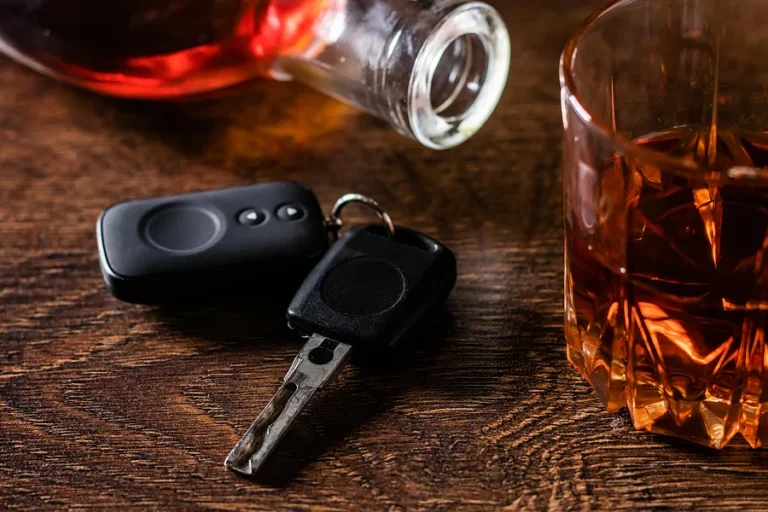
There are several reasons why a DUI case may be thrown out. Some common reasons include the following:
The following steps may occur when an officer pulls you over for suspicion of DUI in North Dakota:
It’s important to know what steps to take after a DUI arrest to protect your rights. One of the best things you can do for yourself is to call Fargo first DUI defense lawyers.
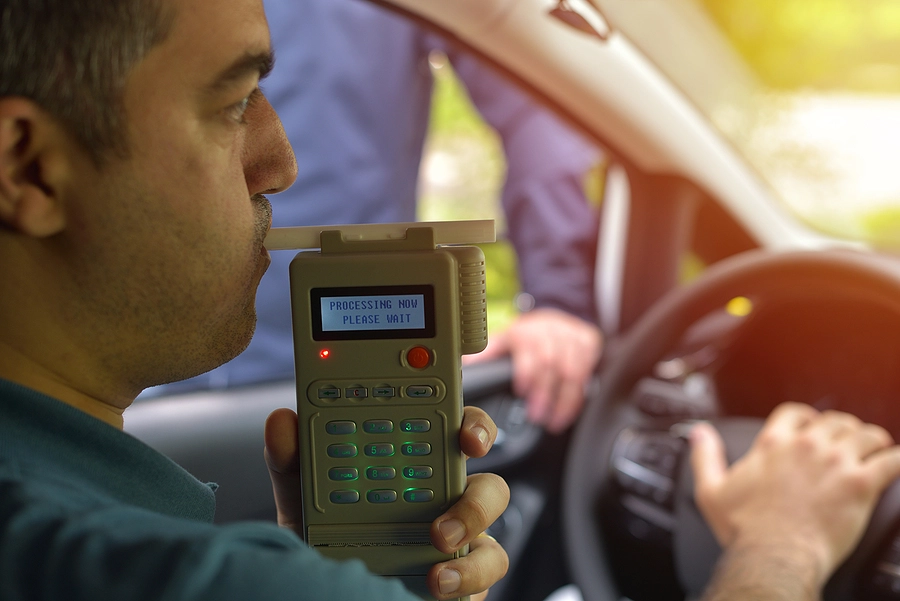
The U.S. Constitution ensures your rights after an arrest. These rights include the following:
A first DUI in Fargo, North Dakota is a Class B misdemeanor. The potential punishments will depend on your BAC level. If it were below .16, you’d face a fine of $500, and if it were .16 or more, you’d have to serve two days in jail and pay a fine of $750.
You’ll lose your license as well. If your BAC were less than .18, you’d lose your driving privileges for 91 days. If it were .18 or higher, you’d lose it for 180 days. You’ll also have to participate in an addiction evaluation program.
A skilled Fargo DUI defense attorney will put together a detailed strategy to argue your ND drunk driving case. Here are just a few of those potential strategies.
An experienced DUI defense attorney will thoroughly review the evidence against you, including the police report, chemical test results, and video or audio recordings of the arrest. They can identify any weaknesses or inconsistencies in the prosecution’s case and use this information to build a strong defense on your behalf.
They’ll also investigate the arrest and the circumstances that led up to it. Your lawyer will look for evidence that could clear you, such as proof that someone spiked your drink.
Your DUI defense attorney will also represent you in court if your case goes to trial. They will cross-examine the prosecution’s witnesses, present evidence and testimony on your behalf, and make powerful closing arguments to the jury.
Facing a DUI charge in Fargo can be stressful, especially if it’s your first time. The DUI defense attorneys of Sand Law are ready to go to work for you. We serve Fargo clients, as well as clients from:
Neighborhoods Near Fargo | Zip Codes Near Fargo |
|
|
This is what happy clients have to say about the quality of legal service at Sand Law:
“I was looking for information regarding ND DUI. I started out with chat. When I asked my question I was immediately called by an attorney. He answered my question and didn’t charge me a nickel. I even offered to pay? Who does that? This speaks directly to the character of Sand Law. If I ever have a need, they will be the first one I call.” -Scott
“I called in to Sand Law, PLLC on a Sunday looking for information about a case. They immediately answered all the questions I had and gave me a consultation free of charge. I was very impressed with how quick the response was. I would recommend this firm to others who are looking for an attorney in Fargo.” -Jeremiah
Sand Law DUI defense attorneys have a great deal of experience helping clients charged with this crime. Whether this is your first arrest or your third or fourth, we’ll do everything we can to have your case dropped or your DUI penalties reduced.
Use our online contact form for a free case review, or call (701) 609-1510.
Yes, a first DUI charge is typically considered a misdemeanor under North Dakota DUI law and will appear on your criminal record. It can also show up in background checks, potentially impacting employment or housing opportunities.
It’s possible but uncommon. A first DUI in Fargo could lead to up to 30 days in jail, depending on factors like your blood alcohol level or if there were aggravating circumstances, such as an accident.
Stay calm and cooperate with law enforcement. Contact experienced Fargo first DUI defense lawyers as soon as possible to review your case and discuss your legal options. Avoid providing more information than required.
Mitigating factors include a lack of prior offenses, demonstrating remorse, completing an alcohol education program, or cooperating fully with authorities during the incident.
If you receive a third DUI in North Dakota, you’re on the edge of spending a long time in prison. If you get a fourth, you’ll be facing felony charges. The stakes have never been higher, so you must take this seriously.
A Fargo DUI attorney with Sand Law is ready to protect your rights. Our law firm has extensive experience in this area of law, and we’ll do everything we can to try and reduce whatever penalties you face. We’ll also work to have your case dismissed entirely if possible. You can schedule a free consultation by calling 701-609-1510 or using our online contact form.
DUI charges occur when a driver has a blood alcohol content level of .08% or more. However, many illegal drugs, such as cocaine, LSD, marijuana, heroin, and others, can also result in a DUI arrest.

If you’re pulled over for driving under the influence (DUI), it’s essential to understand your rights. First, you have the right to remain silent and not incriminate yourself. You don’t have to answer questions beyond providing your name and driver’s license. You also have the right to refuse to take a field sobriety test or a preliminary breath test. However, you may be required to take a chemical test, such as a breathalyzer or blood test, and refusing this test may result in additional penalties.
Even more importantly, you have the right to legal representation. Also, you’re protected from any unreasonable search of your property or yourself and any unreasonable seizure of your property.
You should take several essential steps to protect yourself and your legal rights.
A third DUI conviction carries more than just legal penalties. The personal and professional ramifications can be profound. Relationships may be strained due to the stigma associated with multiple DUIs. Professionally, individuals might face challenges in securing employment, especially if driving is a job requirement.
Future job prospects can also be limited, as many employers conduct background checks. Additionally, a third DUI can lead to increased insurance premiums and even challenges in securing housing. Recognizing these broader implications underscores the importance of seeking experienced legal representation.
As you’ve already learned, driving under the influence (DUI) is a serious offense that can result in severe consequences, including fines, jail time, and your driver’s license suspension. Fortunately, there are steps you can take to prevent a DUI and ensure your safety and the safety of others on the road.
First and foremost, you should never drink and drive. If you plan on consuming alcohol, have a designated driver, use a ride-sharing service, or take public transportation. Alternatively, consider staying overnight at a nearby hotel or calling a taxi.
Of course, the best way to avoid another DUI is to commit to not drinking if you’re out. While making that commitment can be much easier said than done, it will definitely be worth the effort.
Beyond the legal ramifications of a DUI, it’s essential to address any underlying issues that might have contributed to the arrest. Whether it’s alcohol addiction, mental health challenges, or other factors, seeking support and rehabilitation can be a crucial step toward recovery.
In Fargo, there are various programs and support groups available to help individuals address these challenges. Engaging with these resources not only benefits the individual but can also be viewed favorably by the court, potentially leading to reduced penalties or alternative sentencing options.
Being arrested for a DUI can be an overwhelming experience. Understanding the process can provide some clarity. After an arrest, individuals are typically booked and may have their blood alcohol content tested. A court date is then set, during which the accused can plead guilty or not guilty.
If pleading not guilty, the case may go to trial, where evidence is presented and a verdict is determined. Throughout this process, having a knowledgeable attorney is crucial to ensure one’s rights are protected and to navigate the complexities of the legal system.
The Fargo DUI attorneys with Sand Law have extensive experience in DUI defense and can provide valuable assistance. We understand that facing DUI charges can be stressful and overwhelming, and we’re here to help guide you through the legal process and protect your legal rights.
We’ll provide legal counsel and advice throughout your case, helping you understand the charges against you, the potential consequences, and your legal options. We can also help you gather evidence and build a strong defense against the DUI charges.
Our firm can also represent you in court, advocating on your behalf and presenting your case to the judge or jury. We understand the nuances of DUI law, which can be complex and challenging to navigate without legal assistance.
We can also negotiate with prosecutors and work to mitigate the potential consequences of a DUI conviction. These services may include negotiating for reduced charges or penalties or exploring alternative sentencing options, such as community service or rehabilitation programs.
Ultimately, we aim to help you achieve the best possible outcome in your case and move forward with your life. We understand the impact a DUI conviction can have on your future, and we’re here to provide support and guidance every step of the way. Contact us online or call 701-609-1510 for a free case review.
A misdemeanor is a minor criminal charge that can lead to up to a year in prison, financial fines, community service, and license suspension. Criminal defense lawyers like those at Sand Law can help develop legal defense plans to clear someone’s name of a misdemeanor charge.
Common misdemeanors in Fargo include drunk driving, simple assault, trespassing, and indecent exposure. Fargo civilians can be charged with one of three classes of misdemeanors depending on the severity of the crime. The statute of limitations for misdemeanors is two years.
Residents and visitors of Fargo, one of North Dakota’s largest cities, can engage in unlawful behavior that can lead to misdemeanor charges. These are criminal charges that result from minor unlawful behavior, such as reckless driving, trespassing, shoplifting, and simple assault. Fargo has many cultural attractions that can have visitors who engage in unlawful behavior.
While these crimes are not as severe as something like murder, they can still expose others to physical, emotional, or financial harm. Perpetrators of these crimes may have to serve up to a year in prison. If you were charged with a misdemeanor in Fargo, the criminal defense lawyers at Sand Law can use their experience and expertise to help you defend yourself.
Sand Law’s criminal defense lawyers have been operating across North Dakota for years, helping those accused of crimes defend themselves. Our experienced trial attorneys have expertise in each step of the criminal defense process. They can help you collect evidence, craft a legal defense plan, handle court proceedings, and negotiate a fair plea agreement.
Our criminal defense attorneys have built the skills necessary to help with your case through years of developing legal counsel plans and going to trial. They have specific experience helping North Dakota citizens fight against claims of criminal behavior and can assist you in clearing your name of wrongdoing from a misdemeanor charge.
Those charged with misdemeanors in Fargo should seek legal representation immediately. Having trusted counsel in your corner from the beginning can help with the process and give you a voice to defend yourself from claims of wrongdoing. Contact Sand Law today for a free consultation to learn how we can help you clear your name of a misdemeanor charge.

There are two types of crimes that someone in Fargo can be charged with: a felony or a misdemeanor. A felony is a more severe charge for violent, sexual, and financial crimes, such as rape, murder, kidnapping, and burglary. This type of crime can lead to over a year of jail time and thousands of dollars in financial fines.
A misdemeanor is a less serious crime that can still expose others to physical, emotional, and financial harm. These criminal offenses can lead to less than a year of jail time and smaller financial penalties than felony crimes.
People in Fargo can be charged with a misdemeanor when there is probable cause that they committed a crime worthy of a misdemeanor charge. After a misdemeanor charge, the prosecutor has a burden of proof to establish you committed the crime for you to have to experience punishments like prison time, fines, community service, and license suspension.
States have their own rules and processes for handling criminal cases. It’s important for people trying to clear their name of misdemeanors in Fargo to understand how North Dakota law enforcement, prosecutors, and judges will handle cases. They can use this information to understand how to craft a legal defense plan that can help them clear their name.
The following is the Fargo process for misdemeanor cases:
A Fargo criminal defense lawyer can help explain the steps in this process and explain the best way to handle each step. They will have experience handling these steps in other cases and can advise on how to handle them to maximize your chances of success.
Following a misdemeanor charge in Fargo, there are certain steps that the accused should take. These steps can make the legal process much simpler, such as complying with local law enforcement. Certain steps can also help with developing a legal counsel plan to clear you of any wrongdoing.
The following are some things you should do after a misdemeanor charge in Fargo:
Those charged with misdemeanors in Fargo should hire a criminal defense lawyer. They can help you with these steps involved in the legal process and can advise on the best way to handle these steps. After a misdemeanor charge, people must stay wary of mistakes that can affect their ability to clear their name.
An experienced legal defense attorney can be there every step of the process and help handle the process effectively and efficiently. They can explain the North Dakota laws that affect their case, collect evidence to clear their name, and represent them in court to prove to a jury that they did not commit the crime.
At Sand Law, our Fargo criminal defense lawyers have years of experience helping those charged with misdemeanors. We understand the effect a misdemeanor charge can have on someone’s life, as a charge on their record can make it more difficult to get a job.
Our criminal defense attorneys will use their significant experience with North Dakota cases to put you in the best position to succeed. They can communicate with you to develop a legal defense plan that caters to the specifics of your case.
If you were charged with a misdemeanor, you could contact Sand Law today for a free consultation and learn about our six-step process to clear your name. Contact us today for a free misdemeanor case evaluation at 701-394-5396 or on our online contact page.
Misdemeanor charges can lead to penalties that people understand can happen after criminal charges, such as less than a year of prison time and financial fines. However, they can also lead to other punishments based on the committed crime. Nonviolent criminals who cannot pay fines may be subject to hours of community service, such as cleaning up public locations.
Drivers who commit reckless behavior, such as distracted driving, speeding, and drunk driving, can have their license suspended. Those who commit drug or alcohol-related crimes may need to participate in treatment programs to help recover from addiction or co-dependence on drugs and alcohol.
While misdemeanor charges have to do with legal wrongdoing, these incidents can cause victims to suffer economic and non-economic damages. Those who suffer damages from personal injury accidents can try to hold the at-fault party accountable for their negligence.
It’s unlikely for something like trespassing or indecent exposure to lead to a civil claim. However, perpetrators of car accidents and simple assaults can be held liable for damages caused by their reckless or negligent behavior. Sand Law also has experienced personal injury attorneys who can help you handle the process of civil claims.
The statute of limitations for a criminal charge is how long criminal prosecution has to file a charge with the accused criminal. People can only be held liable for unlawful actions for so long, and criminal prosecutors must file a charge within that specific time period.
Each state has its own statute of limitations for different crimes, with the time period differing based on whether a misdemeanor or felony was committed. Violent crimes have a different statute of limitations than less severe crimes. In North Dakota, the statute of limitations for a misdemeanor is two years from the date of the unlawful behavior.
In North Dakota, it’s not much of a stretch to say having a second DUI within seven years is a case of “two strikes and you’re out.” The penalties are incredibly harsh, and the long-term consequences can be even worse. Not only are you looking at the possibility of a lengthy jail term and a significant fine, but you might also eventually find it hard to keep your job – or even find another one.
That’s why fighting your charge will be so important. The attorneys with Sand Law will be ready to provide the most aggressive defense we can on your behalf. Our team will closely examine all the circumstances surrounding your arrest and work to reduce your potential penalties. We’ve sometimes even helped our clients by convincing the court to throw out their cases entirely.
We can’t promise this will happen in your case, but we will promise to fight for your rights. You can schedule a free case evaluation by contacting us online or calling 701-609-1510.
Anyone caught driving a vehicle with a BAC (blood alcohol content) level of .08% or higher will face a DUI charge. But impairment isn’t limited to driving under the influence of alcohol. There are several drugs that can lead to a DUI arrest as well, including the following:
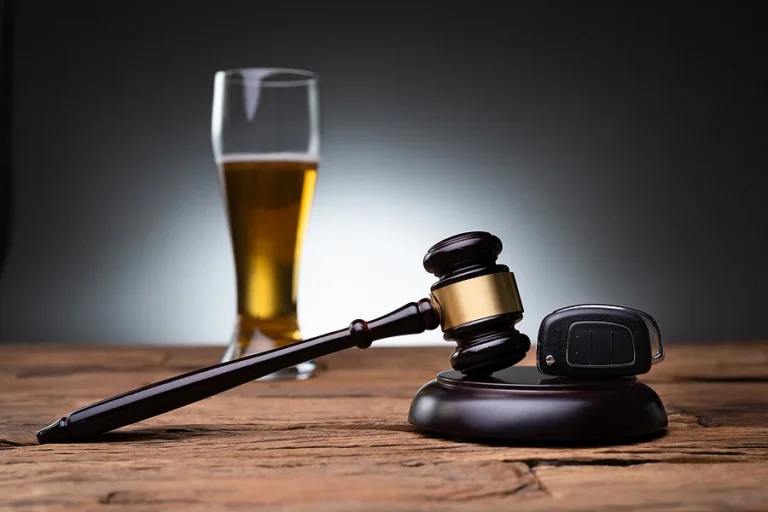
DUI checkpoints, where law enforcement sets up stations to check drivers for impairment, can be a contentious issue. In Fargo, as in many places, these checkpoints are designed to deter drunk driving and catch offenders.
However, there are specific guidelines and rules that law enforcement must follow when conducting these checkpoints. If these rules aren’t adhered to, any arrests made at the checkpoint might be challenged in court. Being aware of your rights and the legality of these checkpoints can be crucial if you’re arrested at one.
Like many states, North Dakota uses a “look back” period to assess DUI penalties. The state looks back at your previous seven years when determining what penalties you face.
Suppose this is your second DUI, and your first was five years ago. Since that second arrest is within seven years, your penalties will be more severe than if there had been 10 years between arrests.
You’ll lose your license for one year if you’re 20 years or younger and have two DUIs within five years. It’s also important to note that the BAC threshold for younger drivers is much lower, and those 20 or younger can face a DUI charge with only a .02% BAC level.
Everyone charged with a DUI must undergo an alcohol or substance evaluation. They must then follow whatever recommendations result from the evaluation. This could mean you’ll have to enroll in a 24/7 sobriety program. You could also have to participate in random drug testing or an alcohol monitoring program. You might be able to reduce your potential jail sentence if you agree to participate in inpatient rehabilitation. Your attorney can tell you if this will be an option in your case.
If your BAC was less than .18% at the time of your arrest, you’ll face a one-year loss of your driver’s license. If it was .18% or higher, you’ll lose your license for two years. In addition, you may need to agree to allow authorities to install an ignition interlock device on your vehicle before you can get your license back. This device measures your BAC. If your level is too high, you won’t be able to start your car.
North Dakota state law classifies a second DUI as a Class B misdemeanor, punishable by 10 days in jail and a fine of up to $1,500. Other penalties include having to participate in the 24/7 sobriety program for 360 days, the loss of driving privileges for one year, and also having to undergo an addiction evaluation.
There are so-called “aggravating circumstances” that could elevate a second DUI from a misdemeanor to a felony.
For example, if someone is impaired and causes an accident that results in a severe injury, that’s a class C felony. The penalties include a 2-5 year jail sentence and up to a $10,000 fine. If the accident results in a death, that’s a class A felony, punishable by 10-20 years in prison and a maximum fine of $20,000. If a minor was in the vehicle at the time of the DUI offense, that’s also considered a class C felony.
Beyond the legal penalties, a second DUI conviction can have profound effects on one’s personal and professional life. Relationships might strain due to the stigma associated with multiple DUIs. Professionally, individuals might face job loss, especially if driving is a job requirement.
Future job prospects can also be limited, as many employers conduct background checks. Additionally, a second DUI can lead to increased insurance premiums and even challenges in securing housing. Understanding these broader consequences underscores the importance of seeking experienced legal representation.
While a second DUI carries severe penalties, some jurisdictions might offer alternative sentencing options. These can include alcohol education programs, community service, or even house arrest in lieu of jail time.
Additionally, some courts might consider rehabilitation programs as part of the sentencing, especially if the offender is struggling with alcohol addiction. Working with a knowledgeable attorney can help explore these alternatives, potentially leading to a more favorable outcome and a chance for the offender to address underlying issues.
North Dakota is an “implied consent” state, meaning you can’t refuse a breath or chemical test if pulled over for a DUI. If you have a driver’s license, in the eyes of the law, you’ve already consented to submit to a test. The penalty for refusal is a suspension of your license for two years.
It’s always important to realize you have rights as a U.S. citizen after being arrested for a second DUI. The most important is the right to remain silent. You don’t have to answer questions from a law enforcement officer without having an attorney by your side. You also have the right to be free from unreasonable search or seizure of your property or person.
There’s a chance the court could throw out your case if an officer violated your rights before, during, or after your arrest. There might not have been sufficient cause to pull you over, or the officer may have made mistakes when administering your field sobriety test. Someone could have mishandled the equipment used in your breathalyzer or blood test. There might not be enough evidence to convict you.
Hiring a DUI defense lawyer as soon as possible will be your best chance of having your case dismissed. Officers may have violated your rights, or other extenuating circumstances could invalidate the arrest. A skilled attorney will determine the best strategy to dismiss your case or reduce your penalties.
A Sand Law DUI defense attorney will do everything possible to help you achieve a positive result in your case. Schedule a free consultation by calling 701-609-1510 or using our online contact form.
Fargo residents and visitors can receive charges for two types of crimes: felonies and misdemeanors. A felony is a serious criminal charge that leads to a criminal suffering severe penalties. The word derives from English common law and describes criminal offenses that led to the accused losing their land and goods.
In North Dakota today, a felony normally involves an illegal act that exposes someone to harm. A majority of crimes that classify as felonies have to do with extreme violence, but they can also include sexual exploitation, theft, and fraud. People in Fargo indicted on felony charges have to serve years in prison and pay thousands of dollars in fines.

Serious crimes that involve violence, sexual assault, theft, fraud, and malfeasance can all lead to felony charges in Fargo, North Dakota. Those charged with these felonies could be convicted of crimes and serve serious jail time for the physical, sexual, and financial harm they exposed someone else to.
The following are some crimes that can lead to felony charges in North Dakota:
At Sand Law, our criminal defense lawyers understand the impact of a felony charge on the accused. It can affect their public reputation and lead people to believe they are dangerous, violent, or greedy. However, not everyone charged with a felony committed the crime they are accused of.
Our felony defense attorneys can help Fargo civilians fight against these felony charges to clear their name of wrongdoing. Our lawyers will communicate constantly with you to help establish the facts of the case and what legal strategy can help put them in the best position to receive an acquittal or dismissal.
Those charged with felonies in Fargo, North Dakota, can contact us for a free consultation to learn about our attorneys and legal strategies that can help clear their names. Contact us today for a free felony case evaluation at 701-394-5396 or on our online contact page.
A felony is a serious crime that can lead to someone serving years of prison time and spending thousands of dollars on financial penalties. However, it is not the only type of crime someone can be charged with in Fargo. They can also receive a criminal charge for committing a misdemeanor.
This is a less serious crime that normally will require less than a year in prison if a resident is convicted. Those charged with misdemeanors will also have less severe financial fines because their crime does not reach the level of harm as a felony.
The following are some crimes in Fargo classified as a misdemeanor:
In North Dakota, felonies generally stay on a person’s record indefinitely. There is no process for completely eliminating a felony crime charge from a person’s record. However, a 2019 North Dakota law allows those charged with felonies and misdemeanors to conceal their crimes.
Those charged with felonies must wait five years after they serve a prison sentence or probation before they can petition a court to seal their charge. Those charged with violent crimes must wait ten years. Either way, the person trying to seal the charge must not commit any other criminal act in the intervening time.
As long as they were on their best behavior after their crime, they can have the record of their felony sealed, so it’s not accessible by the public. This can help those charged with crimes earn employment because companies cannot access the record of their felony. Those charged with extremely violent or sexual crimes cannot have their felony concealed.
Every civilian in North Dakota has civil rights that allow them to vote, hold public office, sit on a jury, and more. However, criminals charged with felonies lose these rights upon conviction. Felony criminals must serve their sentences to have their rights restored. Upon release from imprisonment, those convicted of felony crimes can vote, hold public office, and serve on a jury.
West Fargo, in Cass County, is one of North Dakota’s largest cities and is known for its vibrant downtown atmosphere. Residents and visitors can head to the expanding metropolis’ downtown eating establishments, bars, and entertainment venues for a night of fun.
However, tragedy can strike and lead to someone being charged with a misdemeanor or felony. Those charged with a crime need a trusted attorney in their corner who can help with the multiple stages of litigation. Sand Law’s criminal defense lawyers have decades of experience helping West Fargo criminals receive acquittals through intelligent legal representation.
Those living in West Fargo charged with misdemeanors or felonies will need to consider a criminal defense plan to avoid significant fines and imprisonment. Crimes are unlawful acts that can expose someone else to physical, financial, or sexual harm.
West Fargo crimes normally fall into a couple of different categories: white-collar, property, sexual, violent, or financial crimes. Each type of crime will require a different defense to allow someone to receive an acquittal and avoid significant fines and jail time.
The following are some crimes you could be charged with in West Fargo:
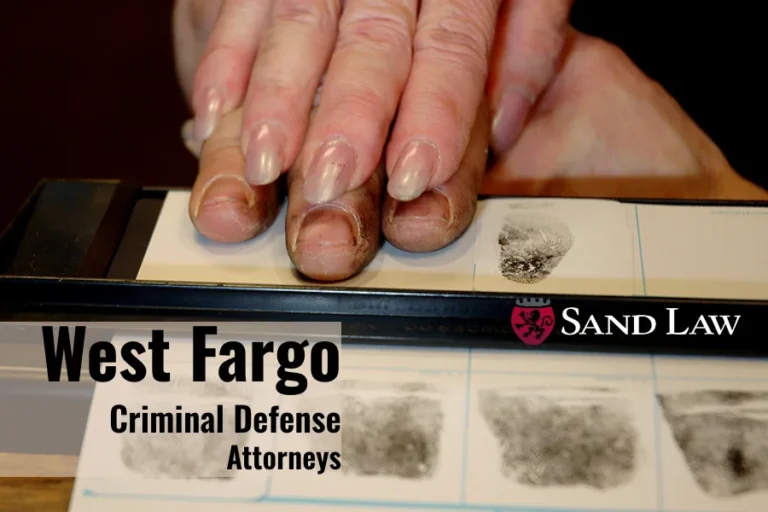
Criminals in West Fargo must consider the statute of limitations of their crimes. This is how long a North Dakota prosecuting attorney has to file a criminal charge before time runs out and the criminal can no longer be held liable.
This amount of time is important for those who possibly committed West Fargo crimes because it gives them a certain amount of time before they know the process will start. They can use this time to prepare a successful defense whether they committed the crime or not.
The following is some information about the statute of limitations in West Fargo:
After being charged with a West Fargo criminal charge, you must consider how to build a successful defense so you do not have to avoid penalties for misdemeanors and felonies. Hiring a criminal defense lawyer from West Fargo is essential to help build a legal defense plan that can help you get acquitted.
An experienced West Fargo criminal defense lawyer will have local and state knowledge that can help inform the claim process. They will also know how crimes are prosecuted and can use this expertise to help you build a legal defense plan that can prove your innocence.
At Sand Law, our West Fargo criminal defense lawyers have a comprehensive understanding of crimes that can lead to a criminal charge. Contact us today at 701-394-5396 or on our online contact page.
Lincoln is one of the smallest cities in North Dakota, with just over 4,000 residents. However, the small number of people living there does not mean there aren’t issues with crimes. Lincoln residents can commit violent, property, financial, and white-collar crimes that can lead to severe punishments.
Those accused of misdemeanor and felony crimes in Lincoln need a defense plan to prevent spending years in prison and having to pay thousands of dollars in fines. Sand Law’s criminal defense attorneys have decades of experience helping North Dakota civilians combat criminal charges to clear their names of wrongdoing.
A criminal act is one in which you can expose other people to physical harm or financial hardship. People in Lincoln can commit crimes that they could be held liable for by law enforcement. They can experience penalties for misdemeanors and felonies in the form of financial fines and imprisonment.
The following are some crimes you could be charged with in Lincoln:
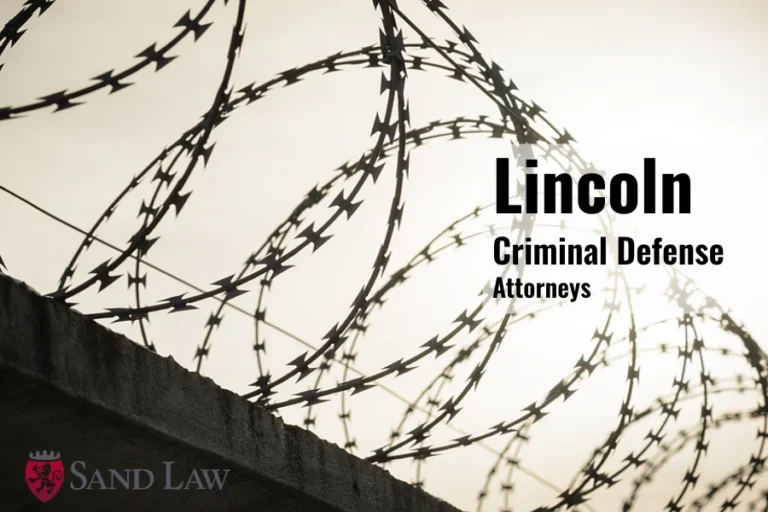
After getting arrested for a crime in Lincoln, your reputation can take a hit. Your picture and story may appear in the news or in local papers, meaning those living near you may view you as a criminal regardless of if you did it or not. You can also experience heavy punishment for your accused crimes, such as prison time or fines.
You can prove your innocence to avoid these punishments by collecting evidence proving you were not where the crime was committed, had nothing to do with the crime, or are being wrongfully framed. A prosecuting attorney must prove you committed the crime and intended to do so. You must collect evidence proving the opposite to clear your name.
Lincoln accused criminals should hire a criminal defense lawyer. They will know how crimes are prosecuted in Lincoln, what North Dakota laws can affect your case, and how to put you in the best position to clear your name.
Some ways an experienced Lincoln criminal defense attorney can help you include gathering evidence, interviewing witnesses, handling court proceedings, and negotiating a plea agreement.
The Lincoln criminal defense lawyers at Sand Law understand how criminal charges are prosecuted in North Dakota. They can use their decades of experience in criminal defense to develop a successful legal counsel plan to help minimize the penalties for a misdemeanor or felony. Contact us for a free consultation today at 701-394-5396 or on our online contact page.
Wahpeton is a southeastern North Dakota city known for its outdoor attractions and rich cultural museums. People living or visiting Wahpeton must know the laws to avoid causing a crime that can lead to significant physical, sexual, or financial harm.
Some crimes that can occur in Wahpeton include murder, vehicular manslaughter, trespassing, drug possession, credit card fraud, etc. The criminal defense lawyers at Sand Law can help you develop a legal defense plan to get acquitted of a Wahpeton criminal charge.
People living in Wahpeton can commit crimes that can leave them contending with significant financial penalties and possible imprisonment. Wahpeton residents can commit two types of crimes: misdemeanors and felonies. A misdemeanor is a minor criminal charge, whereas a felony is a serious charge normally reserved for violent crimes.
The following are some crimes you could be charged with in Wahpeton:
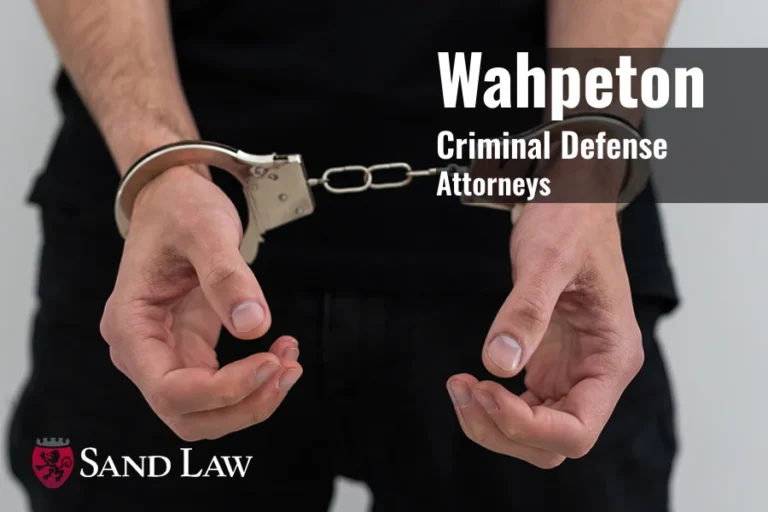
Those accused of Wahpeton crimes must consider acting in a way that can help with their acquittal. This involves complying with law enforcement, paying any fines as soon as possible, and speaking to an attorney about the details of your case.
The following are some steps you should take after being charged with a crime in Wahpeton:
Wahpeton residents charged with crimes should hire a criminal defense lawyer. You could experience a lot of stress and confusion after a criminal charge, especially if you feel you did not do what you are accused of. A criminal defense lawyer can help shut out the noise and help you sort through the details of the accusation.
They can also help you craft a legal defense plan that can put you in a position to potentially get exonerated of the criminal charge. Other ways an experienced criminal defense attorney can help include collecting evidence, speaking to witnesses, handling court proceedings, and negotiating a plea agreement.
At Sand Law, our Wahpeton criminal defense lawyers have decades of experience helping those accused of violent, financial, and property crimes. They can use their experience in handling court proceedings and discovery to help you develop a successful legal counsel plan. Contact us for a free consultation today at 701-394-5396 or on our online contact page.